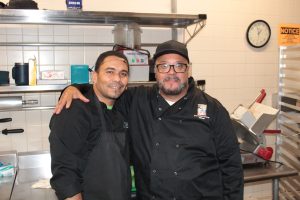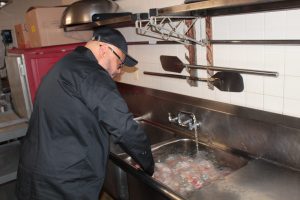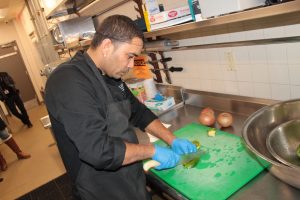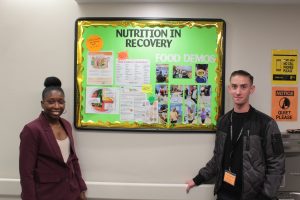
MOHAMED FARGHALY
mfarghaly@queensledger.com
Samaritan Daytop Village, a nationally recognized provider of addiction treatment services, has launched a nutrition initiative aimed at improving the overall well-being of individuals in its recovery programs. With residential facilities in New York City, Long Island, and the Hudson Valley, the organization is focusing on teaching residents how healthier meals and nutrition can support their recovery, both physically and emotionally.
The initiative is implemented across two residential programs in Queens: Van Wyke and Richmond Hill. At the heart of the program is a commitment to fresh, nutritious meals, led by a team of chefs who train clients in culinary skills. The ultimate goal is to help individuals not only improve their eating habits but also empower them to live healthier lifestyles long after they leave the program.
Daniel Mendoza, a cook and cook instructor at the Richmond Hill facility, emphasizes how the program has evolved to incorporate more nutritious ingredients.
“We’re trying to marry sobriety and cooking for medicine, which is a great concept,” Mendoza said. He explained that the kitchen now uses more garlic, fresh vegetables, and fruits to prepare meals, aiming to replace the simpler diets of rice, beans, and processed foods that many clients are accustomed to. “We try to make them healthy with the food,” Mendoza said, noting that many clients have spent years living on the streets with limited access to healthy food.
The transition to healthier eating can be difficult for some clients, but Mendoza has seen positive changes. “As we go by, they’re starting to enjoy it,” he said. He’s seen firsthand the impact the program has had on individuals, not just in terms of nutrition, but in providing hope and skills for the future. Mendoza, who has been sober for over 30 years, views the program as a way to give back, sharing the lessons he learned from his own recovery journey.

The program has already seen success, with two clients graduating from the cooking instruction program. Mendoza works with clients not only to teach cooking skills but also to help them build confidence and prepare for employment in the culinary field. “With a job, you have hope,” he said. “I’m hoping that when they leave here, it’s not Chinese food and pizza. They can make brown rice and other healthy meals on their own.”
For clients like Wayne Kostu, the changes in the kitchen have had a profound impact. Kostu, who has been in the program since August 2023, describes his experience in the kitchen as a transformative one.
“Being in the kitchen has been a good experience,” Kostu said, noting that he’s seen a positive shift in the types of meals being prepared. “You can see that what Danny is doing in there, he’s passionate about what he does.” Kostu points out that the kitchen has not only provided a source of nourishment but also a sense of community and involvement in the recovery process.
Tawana Spriggs, the program administrator, highlights the broader importance of the initiative in the recovery process.
“The purpose of this is to train our staff on nutrition and wellness, so that we can then pass that training on to the clients,” Spriggs said. She stresses the significance of educating clients about how nutrition impacts their recovery, particularly with regard to chronic conditions like hypertension and diabetes, which are common among people with a history of substance use.
“The initiative will hopefully carry itself beyond the treatment program, so when they’re returning home and back into the communities, you have the education to continue the work of healthy living and having a healthy lifestyle,” Spriggs said.
For some participants, like Jose, the program has become a lifeline. Jose, who joined the program four months ago, was struggling with a lack of direction before getting involved in the kitchen.
“Before, I didn’t know what to do,” he said. “Now I want to be part of the kitchen, working here or outside.”
Jose credits Mendoza for his guidance, saying the chef has helped him feel valued and capable. “He teaches me how to cook different, healthy food,” Jose said. “Now I feel like I’m somebody. I can help another client. I can make it easier for people.”

The initiative is not just about nutrition, but about building a sense of self-worth and hope. As the program continues to grow, its impact is felt both in the kitchen and beyond, offering participants the tools to rebuild their lives and health.
With the ongoing support of donors and partners, including a recent grant from Valley National Bank, the program is set to expand, providing even more clients with the opportunity to learn valuable skills and embrace healthier lifestyles. For Samaritan Daytop Village, the nutrition initiative is an integral part of its mission to support individuals in their recovery, helping them build a foundation for long-term health and success.


